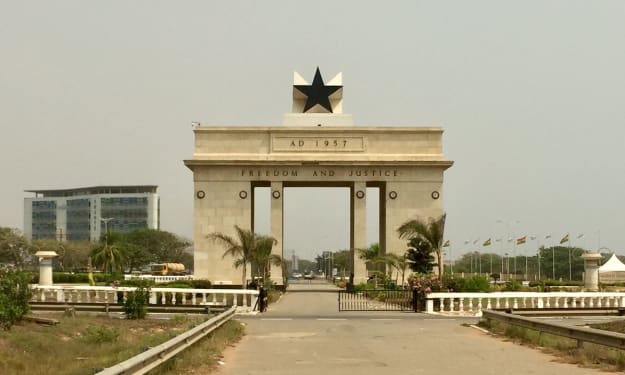By the late 19th century, the British, through conquest or purchase, occupied most of the forts along the coast. Two major factors laid the foundations of British rule and the eventual establishment of a colony on the Gold Coast: British reaction to the Asante wars and the resulting instability and disruption of trade, and Britain's increasing preoccupation with the suppression and elimination of the slave trade.
During most of the 19th century, Asante, the most powerful state of the Akan interior, sought to expand its rule and to promote and protect its trade. The first Asante invasion of the coastal regions took place in 1807; the Asante moved south again in the Ga-Fante War of 1811 and in the Ashanti–Akim–Akwapim War of 1814–16. These invasions, though not decisive, disrupted trade in such products as feathers, ivory, rubber and palm oil, and threatened the security of the European forts. Local British, Dutch, and Danish authorities were all forced to come to terms with the Asante. In 1817 the African Company of Merchants signed a treaty of friendship that recognised Asante claims to sovereignty over large areas of the coast and its peoples. The assets of the African Company of Merchants consisted primarily of nine trading posts or factories: Fort William, Fort James, Fort Sekondi, Fort Winneba, Fort Apollonia, Fort Tantumquery, Fort Metal Cross, Fort Komenda, and Cape Coast Castle, the last of which was the administrative centre.
The coastal people, primarily some of the Fante and the inhabitants of the new town of Accra, who were chiefly Ga, came to rely on British protection against Asante incursions. But the merchant companies had limited ability to provide such security. The British Crown dissolved the company in 1821, giving authority over British forts on the Gold Coast to Charles MacCarthy, governor of the colony of Sierra Leone. The British forts and Sierra Leone remained under common administration for the first half of the century. MacCarthy's mandate was to impose peace and to end the slave trade. He sought to do this by encouraging the coastal peoples to oppose Kumasi rule and by closing the great roads to the coast. Incidents and sporadic warfare continued, however. In 1824 MacCarthy was killed and most of his force was wiped out in a battle with Asante forces.The British were able to defeat an Asante invasion of the coast in 1826 with a combined force of British and local forces, including the Fante and the people of Accra.
When the British government allowed control of the Gold Coast settlements to revert to the British African Company of Merchants in the late 1820s, relations with Asante were still problematic. From the Asante point of view, the British had failed to control the activities of their local coastal allies. Had this been done, Asante might not have found it necessary to attempt to impose peace on the coastal peoples. MacCarthy's encouragement of coastal opposition to Asante and the subsequent 1824 British military attack further indicated to Asante leaders that the Europeans, especially the British, did not respect Asante.
In 1830 a London committee of merchants chose Captain George Maclean to become president of a local council of merchants. Although his formal jurisdiction was limited, Maclean's achievements were substantial; for example, he arranged a peace treaty with Asante in 1831. Maclean also supervised the coastal people by holding regular court in Cape Coast, where he sentenced and punished those found guilty of disturbing the peace. Between 1830 and 1843, while Maclean was in charge of affairs on the Gold Coast, no confrontations occurred with Asante. The volume of trade reportedly increased threefold.
Maclean's exercise of limited judicial power on the coast was so effective that a parliamentary committee recommended that the British government permanently administer its settlements and negotiate treaties with the coastal chiefs to define Britain's relations with them. The government did so in 1843, the same year crown government was reinstated. Commander Henry Worsley Hill was appointed first governor of the Gold Coast. Under Maclean's administration, several coastal tribes had submitted voluntarily to British protection.Hill proceeded to define the conditions and responsibilities of his jurisdiction over the protected areas. He negotiated a special treaty with a number of Fante and other local chiefs that became known as the Bond of 1844. This document obliged local leaders to submit serious crimes, such as murder and robbery, to British jurisdiction; it laid the legal foundation for subsequent British colonisation of the coastal area.
Additional coastal states as well as other states farther inland eventually signed the bond, and British influence was accepted, strengthened, and expanded. Under the terms of the 1844 arrangement, the British appeared to provide security to the coastal areas; thus, an informal protectorate came into being. As responsibilities for defending local allies and managing the affairs of the coastal protectorate increased, the administration of the Gold Coast was separated from Sierra Leone in 1850.
At about the same time, growing acceptance of the advantages offered by the British presence led to the initiation of another important step. In April 1852, local chiefs and elders met at Cape Coast to consult with the governor on means of raising revenue. With the governor's approval, the council of chiefs constituted itself as a legislative assembly. In approving its resolutions, the governor indicated that the assembly of chiefs should become a permanent fixture of the protectorate's constitutional machinery, but the assembly was given no specific constitutional authority to pass laws or to levy taxes without the consent of the people.
In 1872 British influence over the Gold Coast increased further when Britain purchased the Dutch Gold Coast. The Asante, who for years had considered the Dutch at Elmina as their allies, thereby lost their last trade outlet to the sea. To prevent this loss and to ensure that revenue received from that post continued, the Asante staged their last invasion of the coast in 1873. After early successes, they finally came up against well-trained British forces who compelled them to retreat beyond the Pra River.Later attempts to negotiate a settlement with the British were rejected by the commander of their forces, Major General Sir Garnet Wolseley. To settle the Asante problem permanently, the British invaded Asante with a sizeable military force.[61] The attack, launched in January 1874 by 2,500 British soldiers and large numbers of African auxiliaries, resulted in the occupation and burning of Kumasi, the Asante capital.
The subsequent peace treaty required the Asante to renounce any claim to many southern territories. The Asante also had to keep the road to Kumasi open to trade. From this point on, Asante power steadily declined. The confederation slowly disintegrated as subject territories broke away and as protected regions defected to British rule. Enforcement of the treaty led to recurring difficulties and outbreaks of fighting. In 1896 the British dispatched another expedition that occupied Kumasi and forced Asante to become a protectorate of the British Crown. The British abolished the position of asantehene and exiled the incumbent from the colony.
The core of the Asante federation accepted these terms grudgingly. In 1900 the Asante rebelled in the War of the Golden Stool but were defeated the next year. In 1902 the British proclaimed Asante a colony under the jurisdiction of the governor of the Gold Coast. The annexation was made with misgivings and recriminations on both sides. With Asante subdued and annexed, British colonisation of the region became a reality.






Comments
There are no comments for this story
Be the first to respond and start the conversation.